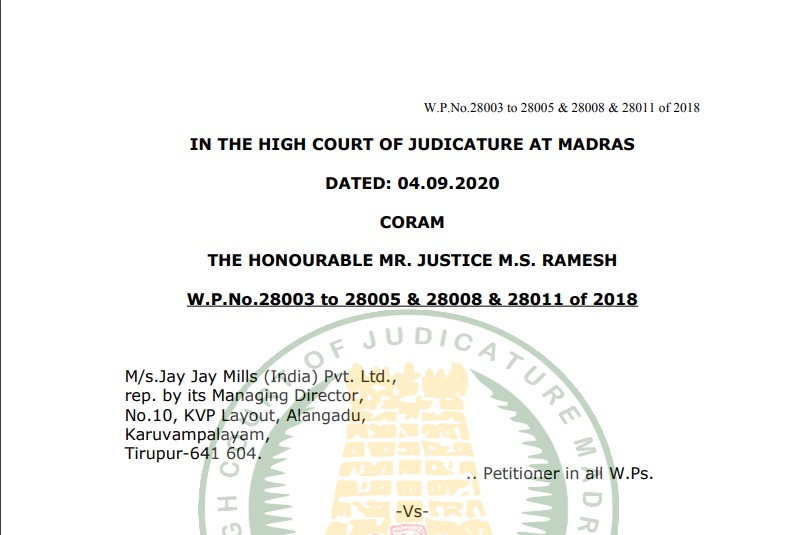Madras HC in the case of M/s. Jay Jay Mills (India) Pvt. Ltd.
Table of Contents
Case Covered:
M/s. Jay Jay Mills (India) Pvt. Ltd.
Versus
The State Tax Officer
Facts of the Case:
The petitioner herein had exported Knitwear and Knitted Fabric, which amounts to zero-rated supply and in terms of Section 16(3) of the IGST Act, 2017, had applied for a refund of ITC under Section 54 of the CGST Act, 2017. The applications were made for the periods of July, August, September, October, and November 2017. The petitioner’s claim came to be rejected through five impugned orders, which are challenged in these Writ Petitions. Since the issue involved in all the Writ Petitions are identical in nature, all these Writ Petitions are disposed of, through a common order.
As rightly contended by the learned counsel for the petitioner, the respondent had, in a cryptic manner, rejected some of the proposals by stating that, as per Section 54 (8)(a), the ineligible goods or services are not directly used for making the zero-rated supply. Apart from this, there are absolutely no other reasons adduced in the order.
Observations of the Court:
It is a settled proposition of law that whenever an application of this nature is made, the statutory authority is bound to consider the claim made and pass a reasoned order. In the present case, the petitioner had made an application for a refund under Section 54 of the Act and when the respondent had issued notice to them for rejection of the ineligible goods and services of SGST, CGST, and IGST, they have given a detailed reply, objecting to the notices. All these objections were required to be dealt with by the authority, before taking a final call, which is conspicuously absent. As such, the order itself can be termed to be “a nonspeaking order” and therefore, are liable to be set aside. However, if the respondent is granted an opportunity to pass fresh orders, after considering the objections of the petitioner, the ends of justice could be secured.
The decision of the Court:
In the light of the above observations, the impugned orders are set aside and the matter is remanded back to the respondent for fresh consideration. The petitioner is at liberty to give fresh objections, at least within a period of 15 days from the date of receipt of a copy of this order. On receipt of such objections, the respondent herein shall consider all the objections raised by the petitioner and extend the due opportunity of personal hearing and thereafter pass appropriate orders, in accordance with the law, as expeditiously as possible, in any event, within a period of 60 days from the date of receipt of the petitioner’s objections. All the Writ Petitions are disposed of accordingly. No costs.
Read & Download the full Decision in pdf:
 ConsultEase Administrator
ConsultEase Administrator
Consultant
Faridabad, India
As a Consultease Administrator, I'm responsible for the smooth administration of our portal. Reach out to me in case you need help.








